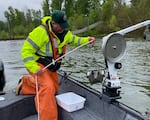You may have heard that various kinds of invasive plants and animals create problems for species that are native to an area. In the case of the quagga mussel, which only grows to the size of a thumbnail, its effects extend beyond the natural ecology and into the built environment.

The Washington Department of Fish and Wildlife sampled for mussels and other invasive species on the Columbia River in 2022. No invasive quagga or zebra mussels have been found in Washington or Oregon waters. But Idaho did find quagga larvae in September 2023 in the Snake River near Twin Falls.
Courtesy of Washington Department Of Fish And Wildlife
The quagga mussel, and the related zebra mussel, came from Eastern Europe to the Great Lakes in the 1980s. In the last dozen years or so, quagga mussels have been found in California, Nevada and Utah. They also appeared in Idaho last year along the Snake River.
Rick Boatner, the invasive species coordinator for the Oregon Department of Fish and Wildlife, says the invasive mussels are what’s known as filter feeders.
“They’re removing the lowest part of the food web out of the water system, the phytoplankton and stuff like that,” Boatner said. “So now you will not have the food needed for our salmon fry and steelhead trout species. So that’s eliminated, and their population is gonna drop.”
Boatner says the impact on various kinds of water systems is enormous.
“They also reproduce quickly, and they like to clog pipes. So anything that draws water from a system they’re in, it’s gonna get completely clogged,” he said. “So now to keep pipes open, they’re gonna basically have to use ramrods to open them up on a regular basis or chemicals or, you know, a UV treatment, some type of treatment so they can keep their water pipes open.”
That means everything from municipal water to irrigation and hydropower. The costs are from the “upper millions to billions of dollars each year if you look at the whole system,” Boatner says. “So it’s going to be a tremendous economic drain.”
One reason the quagga mussel hasn’t taken hold yet is that Oregon set up inspection stations in 2010. Montana, Idaho, Wyoming and Utah also have inspection stations, which have likely helped to protect Oregon as well.
But Boatner says even beefing up inspections and monitoring likely won’t keep quagga mussels out of Oregon for more than a few years. And once they get in, he says, they will “forever change how we use water in Oregon.”
Boatner hopes Oregon will follow the lead of Washington, Idaho and other states in putting more money into prevention. Keeping them out, he says, is still the cheapest way to respond to the threat. He hopes that will give wildlife managers as much time as possible to discover ways to kill the mussels once they arrive. Currently, there are no good methods that do not also kill other aquatic life.
